I think we could spend all day listing the Snares of Samsara…
Have you read this sacred text?:

I think we could spend all day listing the Snares of Samsara…
Have you read this sacred text?:

So no coffee, tea, coke . . . . all with caffeine?
No Sir.
I believe the costs far outweight the benefits.
I think a coke or tea or coffee once a month wont hurt, but its the habitual use that seems to be so detrimental.
This guy says it retards peoples brains:
26:10 I think if you have 100mg a day of caffeine it’s probably fine, but one venti from Starbucks has over 330mg.
I try for a cup before noon, usually with cinnamon. All things in moderation!
149:13 Podcast tradition, last guest leaves a question for this guest. Question: What have you changed your mind about in the past 10 years? Great answer! Check it out.
I am not a doctor, but I think any caffeine consumer will appreciate chapter 3, chapter 4 and chapter 5 of this book:

While 100mg probably is not doing serious damage to the body, it will still produce withdrawal symptoms, and I think it will still affect the vitamins and minerals the body absorbs.
Half-life is around 5 hours (3-12, sources vary):
Lets say you have a 100mg cup at 7am, at noon 50mg will be in your blood, at 5pm, 25mg, and by bed (10pm), 12.5mg. May not seem like much, but that is the same amount of caffeine as drinking 1/3 of a can of coke right before bed. And because its impossible to tell the exact amount of the drug in peoples cups, stronger brews may be closer to 150-200mg of caffeine in each cup.
Chapter 10 of the book gives a game plan for getting off the substance. Those 4 chapters I think are well worth anyones time.
I would consider the information in that text, many hidden secrets that doctors, big pharma, and the health care system does not want people to know about.
Try it for a month or 2. See if your sleep, meditation, and mood see improvement, stay the same, or decline. Quitting is easy:
“''Giving up smoking is the easiest thing in the world. I know because I’ve done it thousands of times.”"- Mark Twain
Try this?
" All with less than half the caffeine of normal coffee. No jitters, no crash."
False advertising, any amount of caffeine will give you a crash and jitters, 50mg is more than is in a can of coke.
I gave it up for lent, and have been going strong since, with only 1 day of cheating. Cold turkey is tough, but I have done it before and lasted over a year. Hope to break my record this time around.
If you are interested in using that, I think its a really smart idea, the author of C.B. recommends weaning off the drug, by upping the amount of decaf coffee grounds you add to your brew.
For ex.
Day 1: 3 scoops regular, 1 scoop decaf
day 7: 2 scoops reg, 2 scoops decaf
day 11: 1 scoop reg, 3 scoops decaf
day 15: 0 scoop reg, 4 scoops decaf
(adjust accordingly)
This mushroom brew seems like a great alternative to replace coffee, 50mg in the morning would likely decay to about 6mg by sleep time.
There is still the problem of Withdrawal Symptoms which are insidious even at these lower levels, its why you feel so good after that first few sips of the brew. Cant tell you the number of times I have walked into a Starbucks, and while waiting in line, had the insight this is just an Alternative Methadone Clinic… ![]() Andrew once said by volume the only commodity that is second to Oil, is Coffee. Not sure if that is true or not, but it goes to show you how addictive this drug is and how difficult it is to get people off of it.
Andrew once said by volume the only commodity that is second to Oil, is Coffee. Not sure if that is true or not, but it goes to show you how addictive this drug is and how difficult it is to get people off of it.
I think the best thing would be to use a mushroom blend as a stepping stone to move to decaff, or a mushroom blend with no caffeiene.
Hopefully you can find or order that book at your local library, well worth reading those 3 important chapters.
I have not tried mud water before, but I liked their advertisement, thought it was well crafted:
Or if you want you can make your own brew:
Smart lady
KANYE 2020
![]()
A deer student shared this article with me yesterday:
(3 wild herbs for lucid dreaming)
"The herbs below are all 100% legal, and easy to get ahold of. However, please do your own research before trying any of them – herbs are medicine and they should be treated with proper caution. These plants each have a variety of other medicinal uses, but we’re focusing solely on their dream-enhancing effects.
Wild Asparagus Root – Asparagus racemosus
 The Chinese word for wild asparagus root is Tian Men Dong – or heavenly spirit herb. For millennia, it’s been cherished by shamans, monks, and yogis for its heart-opening effects.
The Chinese word for wild asparagus root is Tian Men Dong – or heavenly spirit herb. For millennia, it’s been cherished by shamans, monks, and yogis for its heart-opening effects.
Also known as “The Flying Herb”, it’s believed that wild asparagus root helps one fly through the universe at night, achieving magnificent dreams. The wisdom schools of ancient China placed much value on dream work, namely lucid dreaming.
In Chinese folk medicine, it is believed that this particular herb has a direct and positive effect on the heart energy, dissolving the dualities that come with our physical incarnation – black and white, left and right, inside and out. This allows our consciousness to blossom into infinite space while we sleep.
Preparation: the best way to use wild asparagus for this particular purpose is to brew a tea of either the fresh or dried root. Keep in mind that a tea from the fresh root will be much more potent.
Valerian Root – Valeriana officinalis
 This herb has been used in folk medicine for centuries as a calming aid, muscle relaxant, and to promote deep sleep. Because lucid dreaming usually requires a heightened state of slumber, it has become a commonly reported side effect of valerian root.
This herb has been used in folk medicine for centuries as a calming aid, muscle relaxant, and to promote deep sleep. Because lucid dreaming usually requires a heightened state of slumber, it has become a commonly reported side effect of valerian root.
Many also report that valerian greatly improves the ability to remember their dreams. Robert Monroe, a famed specialist in Out Of Body Experiences, once said “Most of us dream, and those who don’t simply are not remembering them.”
Imagine an herb that not only promotes deep states of sleep that are fertile ground for vivid dreams, but also boosts our ability to remember what happened the morning after. Valerian might be just that.
Warning: Because there isn’t enough information available regarding its effects during pregnancy, women who are expecting are better off avoiding it altogether.
Keep in mind: If you already experience extreme dream states, you might think twice before trying valerian. It can intensify your nocturnal adventures quite a bit – which is wonderful when you’re having a good dream, but not-so-great if you’re having a nightmare.
Preparation: Valerian is most commonly brewed in a tea, but be careful to use water that is hot, but not boiling, in order to preserve the delicate oils in the root. Some also prepare a tincture from the dried or fresh root (this can usually be found at health food stores).
Mugwort – Artemisia vulgaris
 Very common throughout the Americas, Europe and Asia, mugwort has a rich history of use, both as a medicinal and metaphysical ally. In the middle ages, it was known as Cingulum Sancti Johannis, because Saint John the Baptist famously wore a belt of it whenever he traveled through the woods. It is referenced often in Celtic and Norse mythology as a magical plant that can ward off evil, and was hung in doorways and burnt as incense to clear stagnant air and prevent illness.
Very common throughout the Americas, Europe and Asia, mugwort has a rich history of use, both as a medicinal and metaphysical ally. In the middle ages, it was known as Cingulum Sancti Johannis, because Saint John the Baptist famously wore a belt of it whenever he traveled through the woods. It is referenced often in Celtic and Norse mythology as a magical plant that can ward off evil, and was hung in doorways and burnt as incense to clear stagnant air and prevent illness.
Mugwort is known as “Molush” by the Chumash Indians of California, and its Paiute name translates literally to “Dream Plant”. It’s often smoked in indigenous ceremonies, and interestingly, is also hailed by various tribes for its power to ward off evil, bad spirits, and disease.
Known for its dream-enhancing effects, many report that Mugwort magnifies the brilliance of color and overall duration of their mid-slumber journeys. On a personal note, I’ve had some lovely experiences with this one ![]()
Mugwort grows just about everywhere. You’ll often find it underfoot, whether in the woods or walking through an overgrown urban environment. Is it sheer chance that this sacred herb that reportedly heightens consciousness is sprouting up all around us?"
My comment to her was “each person has a different system and body reactions making this is a very good opportunity, like in any spiritual work, to get to know yourself and se what better works for you.”
Nonetheless I would love to have your opinion on these herbs Beloved @NightHawk999 @fenwizard and whoever reads this and feels the impulse to doing so.
Thank you for this!!!
The only one in the list I have not tried, and am very excited to.
Valerian is effective at promoting sleep, can leave some grogginess the following day
tastes terrible, tough to swallow. Tough on the lungs if smoked.
Effective for vivid dreams, but darker in visual quality, reminds me of Tim burton artwork. Not necessarily bad dreams, just shady, darker coloring dreams.
Blue Lotus is another herb used for lucid dreaming. I obtained some at a local herbal pharmacy a few months ago and prepared a tea using the recipe in this video. I tried it a few times but didn’t find that it was a magic portal to lucidity. It may have made the dreams slightly more intense or vivid, but hard to say. I did feel a slight buzz from the tea, so it is a legal high. There is one piece of misinformation at the end of this video, that Blue Lotus is illegal in the U.S. It’s totally legal except I think in Louisiana. Some people smoke it for the buzz and there are even blue lotus vape pens available on the internet. This video didn’t recommend smoking for lucid dreaming.
The ancient Egyptians also viewed it as a aphrodisiac and they made blue lotus wine by soaking the lotus flowers in wine for several weeks before consuming.
I bought some from etsy and had very disappointing results
HOWEVER
I think both products we tried were not authentic
![]()
The Dream Team said any product sourced from the US is more than likely going to be garbage, and if you want the real blue lotus, to buy it from Asia.
They didnt give a vendor, but hinted at how to source the authentic stuff in one of their home run videos
![]()
Another lucid dream herb is the Mexican herb Calea Zacatachichi. I believe that it was traditionally used by Native Mexican shamans. I also experimented with this one for a bit back in the 90’s or early 2000’s but again didn’t have lucid dreams from it. I know a bit more about lucid dreaming now then I did then, so I may experiment with this one again. It’s worth a try.
Hmmm. . . I wonder why blue lotus purchased in the U.S. would be different.
Been on my bucket list for years, have not tried yet, but heard good things
Why would the Mob sell sunflower oil branded as Olive Oil?
The stuff I got was from an herbal pharmacy that is a trusted source for medicinal herbs in my community. It also looked like blue lotus flowers. It also gave me a buzz, so it was pharmacologically active. Perhaps not everything sold online is real, but my hit about this is that it was. I may try it again at a higher dose.
Keep me posted on your results
in the mean time I will try to do some detective work with the DT, and see if I can make contact with their international supplier…
"African dream root is an herb native to South Africa.
Traditionally, people used the plant’s roots to treat several health conditions. In addition, the Xhosa people of South Africa used the roots to stimulate vivid or lucid dreams, which they believed helped them communicate with their ancestors.
This article provides an overview of African dream root, its potential benefits, precautions, and how to consume it."